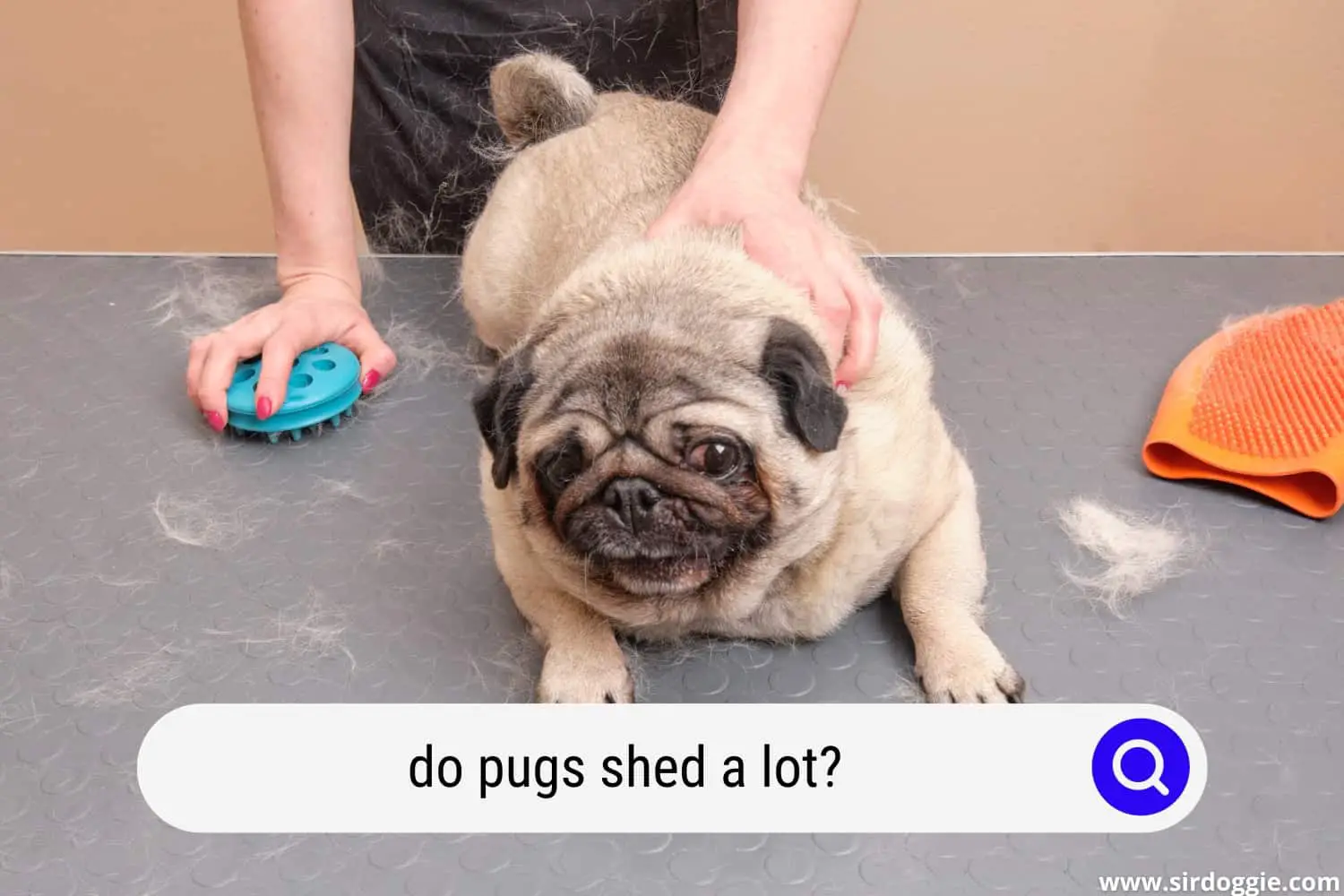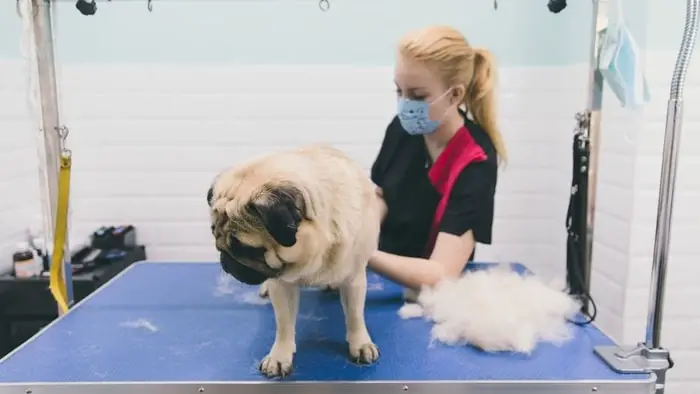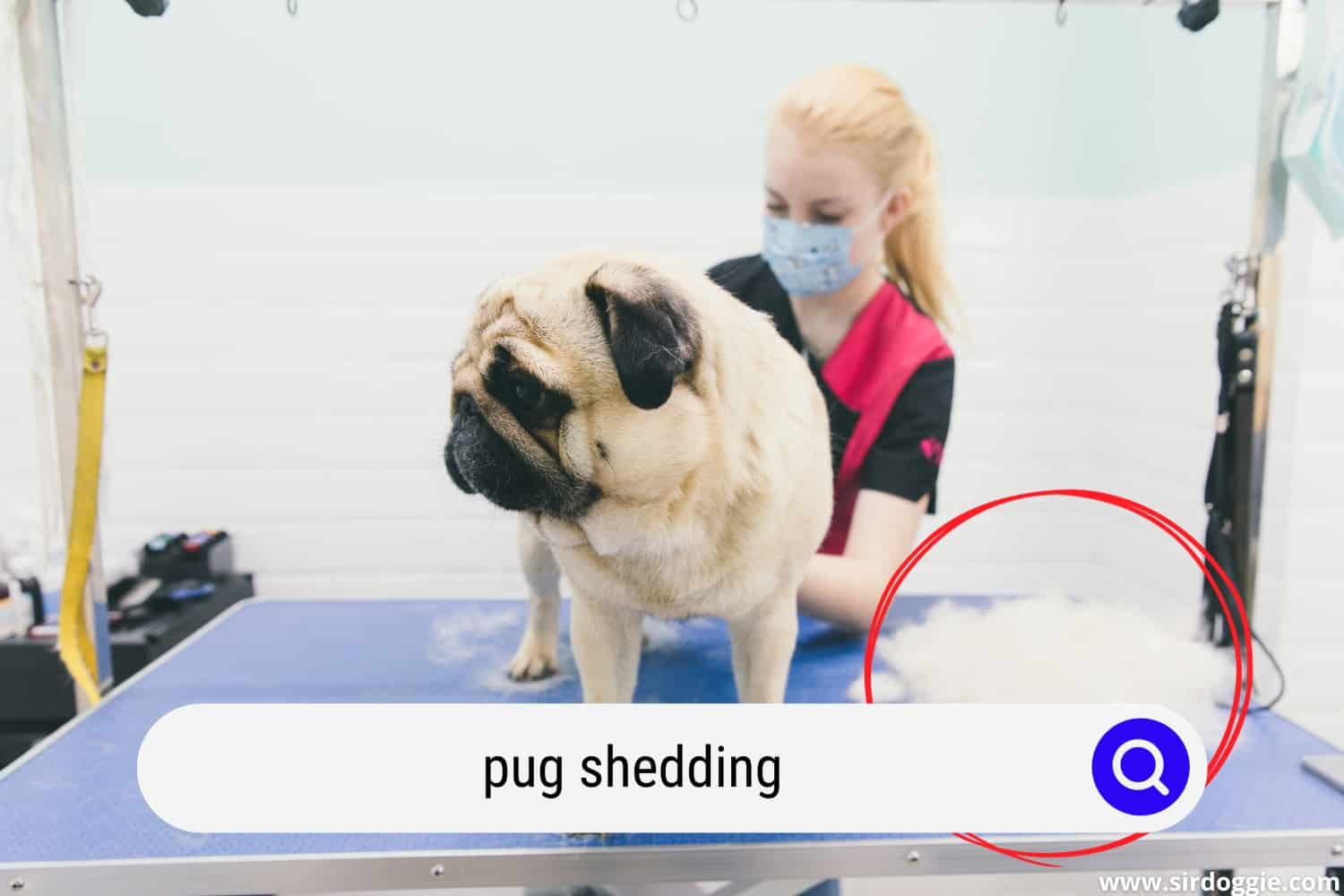Do Pugs Shed A Lot?
Any dog parent knows that pooches usually shed: some more, some less. It all depends on the breed. You can just look at a dog’s coat and have an idea of how badly he/she will shed.
Shorter-coated ones (like Terriers-all kinds, Fox Hounds, Shih-Tzus, and Schnauzers) don’t require much upkeep while the long-coated ones usually do (like Spaniels, Afgan Hound, Bergamasco, etc.). So even if the shorter ones shed, it is not going to be as much of a big deal as in the case with the longer-haired breeds.
So do Pugs shed a lot? Let’s find out!

What Kind Of Breed Is A Pug?
Pugs are a toy breed as they never get bigger than 20 lbs (the average weight range is 13-18 lbs). They can be brought into a home with small children and other dogs. This breed is one of the friendliest, cuddiest, and happiest breeds in the world. If you have a small living space, a pug pal will fit in perfectly as it wouldn’t need a lot of space to move around.
They would be a great match for first-time canine parents because pugs are very easy to train and care for. There are no training issues usually with this breed as they are very loyal and obedient to their owners. Pugs tend to be on the mischievous side from time to time, but this fact just adds to their charm. Pups typically grow out of it once they hit adolescence.
They have a sleek, shiny coat, not fluffy at all, and their colors vary from ivory, dark beige, and apricot, to black.
Do Pugs Shed A Lot Of Hair?
The answer is yes, they do, unfortunately. Their coat consists of two layers: a very soft undercoat and a coarse, usually darker outer coat. The reason for it is that both fur layers help shield delicate Pug’s skin in harsh weather conditions like extreme heat or cold.
To make matters worse: Pugs shed year-round! Little by little, they are changing their mane and the evidence of that ends up on your carpets, furniture, and all over the floor. Their shedding is especially bad before winter and before summer. A Pug grows a thick coarse winter coat to protect it from the freezing cold. And on the contrary, it will lose its winter mane to lighten up the heavy coat-carrying burden.
Even if you think that shaving your Pug in the summer will benefit it, think again: you will be exposing its skin to the sun’s harmful rays, and it can possibly get a sunburn. Shaving in the winter can give it frostbite, so not a good option either.

Learn more about: Can You Shave a Pug: What First Time Pug Owners Should Know
How Much Do Pugs Shed?
I hate to say it, but they do shed quite a bit! It is hard to believe, but it’s true since their coats are so short. The reason being is that even though they don’t have a long mane, they do have a lot of short strands per square inch.
Interesting fact: light-colored Pugs shed more than the black-haired ones. That’s because the noir Pugs have only one layer of fur, compared to the lighter same-breed pooches (they have two coats as we have discussed previously).
Therefore, if you are thinking about getting a pug and have some allergies issues, you need to consider getting a dark-colored one. Even though they don’t shed as much, you will still need to regularly brush out your pooch with a good-quality shedding comb or a hound glove to get as many loose hairs as possible. And speaking of this, let’s take a look at the most common solutions for excessive shedding.
What Causes Pugs To Shed A Lot?
Some of the reasons can include:
- Poor nutrition: if you don’t give your dog good-quality food, it’s not going to get the necessary vital elements to help it stay in tip-top shape. Its coat can lose its luster, and get dry. You can even spot some dandruff on it from time to time.
- Stress: Whether you have moved to a new area or recently introduced a newborn into your family, it is always a stress for the fluffy companion. Try to give it the same love and affection, no less than it used to.
- Allergies: yes, just like us, the four-legged pups are prone to different types of allergies. They can have food allergies, pollen allergies, and even allergies from dust in the house! The best way to find out what the hair-loosing issue might be is to talk to a veterinary specialist and perform a few lab tests.
- Change in Personal Care: you might be surprised, but not all pooch shampoos are created equal. The less natural ones can contain Laureth and Laurel Sulfates, which are extremely harsh on a gentle Pug’s skin. Therefore, your pal might have a severe reaction to the shampoo’s ingredients.
Try to stick to a more natural, non-irritating alternative, like Burts Bees Puppy Shampoo. This product is about 95% natural, so your pup and its coat will be forever grateful you chose this kind to take care of its delicate mane.

How To Manage Your Pug’s Shedding
- Brushing regularly: as mentioned above, that is one of the most crucial steps in shedding management. Invest in a good-quality shedding comb to get the most stubborn, deep-rooted loose hairs out. Your floors will thank you in the long run.
- Proper nutrition: the more vitamins a pooch gets, the healthier it will be all around, including its coat. Good nutritious supplements aid in skin’s strength, and consequently in a shiny, strong, lustrous mane.
- Bathing: hot water and hand-massaging the pooch’s coat helps to get rid of those unwanted old hairs. You will be surprised how many will end up on that bathtub floor!
- Enough hydration: just like humans, the four-legged need to drink plenty of water for them to stay energetic, to keep that delicate skin soft and supple, and for proper thermoregulation.
Curl-Up
Even though Pugs shed, it shouldn’t stop you from adopting one. Just make sure you follow the guidelines outlined in this article and you will have fewer problems with Pug’s constantly shedding fur that ends up everywhere in the house. Take proper care of your pal and bring it to the vet regularly to make sure that it doesn’t lose hair for the wrong reasons.
Read more about: Is A Pug Right For Me?

Family Dog Expert Author
Hi there! I’m Stuart, a devoted dog lover and family dog expert with over a decade of experience working with our furry companions. My passion for dogs drives me to share my knowledge and expertise, helping families build strong, loving bonds with their four-legged friends. When I’m not writing for SirDoggie, you’ll find me hiking, playing with my beautiful dog, or studying music.